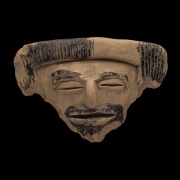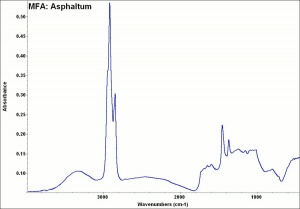Difference between revisions of "Asphaltum"
(username removed) |
|||
| Line 2: | Line 2: | ||
== Description == | == Description == | ||
| − | 1) An old name for [ | + | 1) An old name for [[asphalt|asphalt]] generally used prior to the 1800s. |
| − | 2) In the 17th and 18th centuries, the term asphaltum also referred to a transparent brown, [ | + | 2) In the 17th and 18th centuries, the term asphaltum also referred to a transparent brown, [[asphalt|asphalt]]-based pigment used in [[watercolor%20paint|watercolor]] and [[oil%20paint|oil paints] for glazes and shadows. The oily material can slow the drying of [[linseed%20oil|linseed oil]] producing a soft film. With time, asphaltum in dried oil films can result in the movement or disfigurement of the film as well as [[allligator%20crack|allligator cracks]]. Asphaltum was sold commercially as a transparent brown artist pigment under the name bitumen (Gettens and Stout 1966). |
== Synonyms and Related Terms == | == Synonyms and Related Terms == | ||
Revision as of 10:12, 8 January 2014
Description
1) An old name for Asphalt generally used prior to the 1800s.
2) In the 17th and 18th centuries, the term asphaltum also referred to a transparent brown, Asphalt-based pigment used in watercolor and [[oil paint|oil paints] for glazes and shadows. The oily material can slow the drying of Linseed oil producing a soft film. With time, asphaltum in dried oil films can result in the movement or disfigurement of the film as well as allligator cracks. Asphaltum was sold commercially as a transparent brown artist pigment under the name bitumen (Gettens and Stout 1966).
Synonyms and Related Terms
2) bitumen; Antwerp brown; asphalt paint; Asphalt (Deut.); asfalto (Port.); asphalte (Fr.); asfalto (Esp.); asfaltos (Gr.); alfalto (It.); bitume (It.); asfalt (Ned.); asfalto (Port.)
Other Properties
Soluble in petroleum hydrocarbons, turpentine, and most organic solvents. Partially soluble in oils.
Hazards and Safety
Combustible. Softens at slightly elevated temperatures.
Ages poorly in dried oil films resulting in movement, disfigurement and/or cracks.
Additional Information
° R.White "Brown and Black Organic Glazes, Pigments and Paints" National Gallery Technical Bulletin, 10:58-71, 1986. ° R. J. Gettens, G.L. Stout, Painting Materials, A Short Encyclopaedia, Dover Publications, New York, 1966
Authority
- R. J. Gettens, G.L. Stout, Painting Materials, A Short Encyclopaedia, Dover Publications, New York, 1966
- Ralph Mayer, A Dictionary of Art Terms and Techniques, Harper and Row Publishers, New York, 1969 (also 1945 printing)
- Susan E. Schur, Conservation Terminology: A review of Past & Current Nomenclature of Materials, Technology and Conservation, Spring (p.34-39); Summer (p.35-38); Fall (p.25-36), 1985
- R.D. Harley, Artists' Pigments c. 1600-1835, Butterworth Scientific, London, 1982
- Dictionary of Building Preservation, Ward Bucher, ed., John Wiley & Sons, Inc., New York City, 1996
- Thomas B. Brill, Light Its Interaction with Art and Antiquities, Plenum Press, New York City, 1980
- Art and Architecture Thesaurus Online, http://www.getty.edu/research/tools/vocabulary/aat/, J. Paul Getty Trust, Los Angeles, 2000

